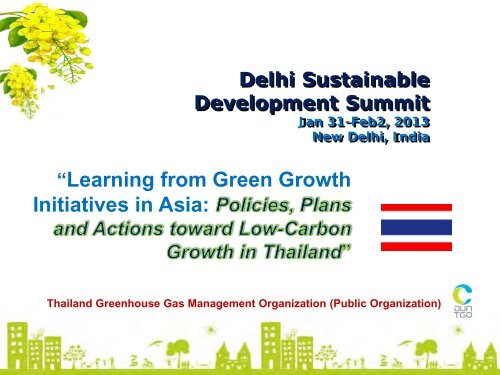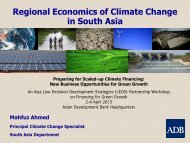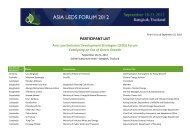PowerPoint Template - Low Emissions Asian Development
PowerPoint Template - Low Emissions Asian Development
PowerPoint Template - Low Emissions Asian Development
You also want an ePaper? Increase the reach of your titles
YUMPU automatically turns print PDFs into web optimized ePapers that Google loves.
Delhi Sustainable<br />
<strong>Development</strong> Summit<br />
Jan 31-Feb2, 2013<br />
New Delhi, India<br />
“Learning from Green Growth<br />
Initiatives in Asia:<br />
Thailand Greenhouse Gas Management Organization (Public Organization)<br />
2/12/2013
Contents<br />
1<br />
2<br />
General Information of Thailand<br />
Overview of Thailand Policies on Climate Change<br />
3<br />
Mitigation Actions in Thailand<br />
4<br />
Climate Change International Training Center (CITC)<br />
2/12/2013<br />
2
1. General Information of Thailand<br />
2/12/2013<br />
<br />
Population:<br />
Thailand has a<br />
population<br />
of over Kingdom 65 of THAILAND<br />
Population: ~ 69.5 M<br />
about 10 million<br />
Area: ~ 514,000 km<br />
people<br />
2<br />
Capital City: Bangkok<br />
reside in the capital city<br />
of Bangkok<br />
3
1 : General Information of Thailand<br />
Economy:<br />
The economy of Thailand<br />
is a newly industrialized<br />
economy and a major<br />
exporter. Tourism also<br />
contributes significantly to<br />
the Thai economy.<br />
2/12/2013<br />
4
2. Overview of Thailand Policies on Climate Change<br />
National<br />
Policy<br />
Framework<br />
The 11 th National<br />
Economic and Social<br />
<strong>Development</strong> Plan<br />
2012-2016<br />
Government Policy of<br />
the Prime Minister<br />
H.E. Ms.Yingluck Shinawatra<br />
Ministry of Natural Resources and Environment (MoNRE)<br />
National Plans on<br />
climate change &<br />
environment<br />
National Master Plan on Climate<br />
Change<br />
2011-2050<br />
National<br />
Environmental Quality<br />
Management Plan 2012-2016<br />
National<br />
Sectoral<br />
Plans<br />
Ministry of Energy<br />
Energy<br />
Conservation<br />
Plan<br />
2011- 2030<br />
Alternative<br />
Energy<br />
<strong>Development</strong><br />
Plan<br />
2008 - 2022<br />
Ministry of<br />
Transport<br />
National<br />
Transport<br />
Master Plan<br />
2011- 2020<br />
Ministry of<br />
Industry<br />
National<br />
Industrial<br />
<strong>Development</strong><br />
Master Plan<br />
2010- 2014<br />
Ministry of<br />
Agriculture and<br />
Cooperative<br />
(Draft) Strategic<br />
Plan on Climate<br />
Change in the<br />
Agricultural Sector<br />
5<br />
2/12/2013
National Framework Policy<br />
1. The 11th National Economic and Social<br />
<strong>Development</strong> Plan 2012 – 2016<br />
• Paradigm shift to green and low carbon society<br />
• Capacity building on adaptation to reduce vulnerabilities<br />
to climate change impact<br />
• Develop the database and registry system of GHG<br />
emission and carbon market<br />
• To establish carbon fund and promote carbon market<br />
• Develop the Thailand’ MRV system<br />
• Promote the carbon label and carbon footprint<br />
2/12/2013 6
National Framework Policy<br />
2. Government Policy of the Prime Minister<br />
Ms. Yingluck Shinawatra<br />
• Energy Policy Section: to promote CDM / global warming<br />
issue in manufacturing, transportation and residential<br />
sectors.<br />
• Industrial Policy Section: to increase the usage of RE in<br />
industrial sector by using revenue from selling carbon<br />
credit as incentive.<br />
• Land Natural Resources and Environment Section: to<br />
promote urban development and reduce GHG emission with<br />
an aim to become low carbon society.<br />
2/12/2013<br />
7
National Environmental & Climate Change<br />
Plans<br />
3. National Master Plan on Climate Change (2011 – 2050)<br />
The ultimate Goal of Thailand’s Climate Change Master Plan is to<br />
reduce GHG emission and to be a <strong>Low</strong> Carbon Society in the next<br />
40 years (2050)<br />
Mission:<br />
• To enhance capacity for resilience socio-economic<br />
development and ecosystems<br />
• To reconstruct economic development to a low carbon<br />
society<br />
• To promote sustainable development in a Thai context<br />
2/12/2013 8
National Sectoral Plans<br />
4. Energy Conservation Plan 2011-2030 (20 Years Plan)<br />
• Reduce the energy intensity by 25% in 2030<br />
• Apply 5 strategies to accelerate the plan;<br />
1. Apply the compulsory program with strong regulation and standard; e.g.<br />
mandatory labeling or minimum energy performance standards (MEPS)<br />
2. Apply complimentary program including voluntary agreement including<br />
demand side management (DSM) and energy service company (ESCO).<br />
3. Apply realization and behavior change in energy consumption in<br />
widespread society; e.g. low carbon economy concept or eco-driving.<br />
4. Support the technology development and innovation in higher efficient<br />
devices/appliances.<br />
5. Capacity building and institutional arrangement from both public and<br />
private entities.<br />
• By conclusion, total cumulative energy saving from this plan is 290,000 ktoe<br />
and it can avoid the carbon dioxide from energy consumption at around 980<br />
million tons from 2011 to 2030.<br />
Source: DEDE (2012) -7-<br />
2/12/2013<br />
9
National Sectoral Plans<br />
5. Renewable Energy <strong>Development</strong> Plan 2008-2022<br />
• The plan is targeting an increase in the share of renewable<br />
energy to be 20% of Thailand’s final energy mix by 2022<br />
Objectives<br />
1. to utilize renewable energy as a major energy supply to<br />
replace oil imports<br />
2. to increase energy security<br />
3. to promote utilization of green energy in communities and<br />
enhance development of the renewable energy technology<br />
industry<br />
4. to research and encourage highly efficient renewable energy<br />
technologies<br />
2/12/2013<br />
-6- 10<br />
Source: DEDE (2010)
3. Mitigation Actions in Thailand<br />
I. Implementation on Clean <strong>Development</strong> Mechanism (CDM)<br />
Received Letter of Approval: LoA<br />
221 Projects<br />
12.71 MtCO2e/year<br />
registered at CDM EB 89 Projects 4.35 MtCO2e/year<br />
Issuance of CERs 21 Projects 1.97 MtCO 2 e/year<br />
2/12/2013<br />
As of 24 Dec 2012<br />
11
3. Mitigation Actions in Thailand<br />
Carbon Reduction Label<br />
163 Products / 42 Firms<br />
@ 20 Nov 2012<br />
Carbon Footprint for Product<br />
726 Products/ 177 Firms<br />
@ 12 Oct 2012<br />
Cool Mode<br />
18 Patterns/ 6 Firms<br />
@ 1 Jan 2012<br />
II. Carbon Labels<br />
2/12/2013 12
3. Mitigation Actions in Thailand<br />
III. <strong>Low</strong> Carbon City: Muang Klang Municipality is a small-size<br />
municipality located in Rayong Province<br />
Objective : Develop Muangklang<br />
Municipality as a pioneer small-size<br />
municipality towards low carbon city<br />
approach, and enhance the city’s good<br />
practice as a replication in other cities<br />
City area : 14.5 km 2<br />
Population : 17,197<br />
Households : 3,309<br />
Communities : 13<br />
2/12/2013<br />
13
Nine-step approach to Thai <strong>Low</strong> Carbon City<br />
1. Survey<br />
8. Implementation<br />
2. GHG Inventory<br />
7. Action plan<br />
9. Review<br />
3. Technology<br />
analysis<br />
2/12/2013<br />
6. Targeting<br />
5. Projection<br />
4. Technology<br />
selection<br />
14
Muangklang Municipality voluntary mitigation goals<br />
(from stakeholders’ consultation)<br />
Within 5 years:<br />
Reduce 100 kg CO 2 e/capita/yr<br />
(5%)<br />
Mitigation measures<br />
Within 10 years:<br />
Reduce 200 kg CO 2 e/capita/yr<br />
(10%)<br />
Energy saving/efficiency Reduce fuel use Increase greenspace Waste management<br />
2/12/2013<br />
Transport<br />
measures<br />
• Biofuel<br />
• NGV<br />
• Bicycle<br />
• Public bus<br />
15
Lessons learned : key success factors and barriers<br />
Key success factors<br />
Barriers<br />
Local government leaders have<br />
understandings and political will<br />
Recognize co-benefits from GHG<br />
mitigation<br />
Communication on good practice<br />
Involvement of stakeholders<br />
Readiness of entities in charge<br />
Data collection and information<br />
access (limited of information)<br />
Gap of understanding among<br />
stakeholders<br />
‘<strong>Low</strong> Carbon City model’ need<br />
modification before using with<br />
others cities<br />
Next<br />
steps:<br />
• Networking with other cities<br />
• Enhance <strong>Low</strong> Carbon city concept to other cities<br />
2/12/2013<br />
16
4.Climate Change International Training Center (CITC)<br />
Thailand Greenhouse Gas Management Organization<br />
(Public Organization) (TGO)<br />
Japan International Cooperation Agency (JICA)<br />
Climate Change International Training Center (CITC) is a<br />
“one-stop training center” on Mitigation and Adaptation for<br />
ASEAN and other interested countries.<br />
Objectives<br />
TGO capacities as a focal point of CITC are enhanced with<br />
programs in response to the needs of stakeholders<br />
Capacities of key stakeholders related to<br />
Mitigation/Adaption/GHG Inventory are enhanced<br />
Targets<br />
Mitigation/Adaptation related government agencies, academic<br />
institutions, private companies and general public<br />
2/12/2013
CITC Concept<br />
. Climate<br />
Change<br />
• In-depth training and hands-on approach<br />
• Train the Trainers<br />
• Policy Recommendations<br />
• Integration of Mitigation and Adaptation<br />
Mitigation<br />
(including GHG<br />
Inventory)<br />
Adaptation<br />
Sustainable <strong>Development</strong><br />
Achieving<br />
<strong>Low</strong> Carbon Society<br />
Carbon Reduction, Good Quality of Life, Environmental Friendly<br />
2/12/2013
CITC Curriculum <strong>Development</strong><br />
Mitigation<br />
Policies &<br />
Strategies<br />
GHG<br />
Inventory<br />
Mitigation<br />
Measures &<br />
Assessment<br />
Climate<br />
& Trade<br />
<strong>Low</strong> Carbon<br />
Initiatives<br />
& Knowledge<br />
Transfer<br />
• UNFCCC Structure &<br />
Regional CC/Mitigation<br />
policies& direction<br />
• Mitigation in the<br />
context of CC/SD&<br />
UNFCCC<br />
• Nationally<br />
Appropriate Mitigation<br />
Actions (NAMAs)<br />
•Measurement/Reporti<br />
ng/ Verification (MRV)<br />
• Reducing Emission<br />
by Deforestation &<br />
Forest Degradation<br />
(REDD)/REDD+<br />
• GHG accounting<br />
and MRV procedure<br />
• Data collection<br />
&management<br />
system<br />
• GHG accounting<br />
guideline and<br />
standard<br />
• Inventory Quality<br />
Management<br />
(QA/QC)<br />
• Verification process<br />
and pit fall<br />
• International trend<br />
in GHG Mitigation<br />
Measures<br />
• Carbon sinks<br />
• Mitigation Measures<br />
• Barriers to Mitigation<br />
• Mitigation<br />
Mechanism i.e. CDM,<br />
Bilateral Agreement<br />
• Mitigation Methods &<br />
Tools<br />
• History &<br />
Background of CT<br />
markets in the world<br />
• EU-ETS & Tokyo<br />
Cap-and-Trade<br />
• Voluntary Emission<br />
TradingScheme<br />
• National Registry<br />
System<br />
• <strong>Low</strong> Carbon City<br />
• Carbon Footprint<br />
• Carbon Labels<br />
• Capacity Building,<br />
Knowledge<br />
Distribution and<br />
awareness raising &<br />
outreach<br />
2/12/2013 19
Thank You for you Attentions …..<br />
Thailand Greenhouse Gas Management<br />
Organization (Public Organization) (TGO)<br />
Government Complex, Bldg. B, Fl. 9,<br />
120 Chaengwattana Rd., Laksi,<br />
Bangkok 10210 THAILAND<br />
Tel. +662 141 9790<br />
Fax. +662 143 8400-5<br />
E-mail: info@tgo.or.th<br />
URL: www.tgo.or.th<br />
2/12/2013
1. Climate Change Administrations<br />
Ministry of National Resources and<br />
Environment (MoNRE)<br />
Office of Natural Resources<br />
and Environmental Policy<br />
and Planning (ONEP)<br />
Thailand Greenhouse Gas<br />
Management Organization<br />
(Public Organization)<br />
-National Focal Point of UNFCCC<br />
- Focal point for climate change<br />
implementation (adaptation)<br />
-Designated National Authority<br />
(DNA) for CDM<br />
- Implementing agency to promote<br />
GHG emission reduction<br />
2/12/2013 21
1. Climate Change Administrations<br />
Institutional Frameworks for Climate Change in Thailand<br />
Source: Thailand’s SNC 2011<br />
2/12/2013 22
3. Mitigation Actions in Thailand<br />
I. Implementation on Clean <strong>Development</strong> Mechanism (CDM)<br />
Biogas from anaerobic digestion<br />
◦ Treating wastewater from starch production, palm oil<br />
extraction, ethanol plants, pig slurry<br />
◦ Landfill sites with gas collecting system<br />
Energy from biomass<br />
Heat recovered from cement plants<br />
Wind and solar farms<br />
Small hydro-power schemes<br />
N 2 O reduction schemes<br />
Organic fertilizer produced from digestate and residues<br />
Transportation projects<br />
Energy saving projects relating to shifting fuel modes and<br />
improving processes<br />
2/12/2013<br />
-8- 23
3. Current Situation on Climate Change Mitigation<br />
Achieving <strong>Low</strong> Carbon Cities through Local Sustainable<br />
Urban Systems Management in Thailand<br />
The proposed project aims to promote the energy efficiency, low carbon<br />
transport and urban systems in a sustainable manner.<br />
Activities<br />
•GHG Inventory development<br />
• Action plan for <strong>Low</strong> Carbon City<br />
• Capacity Building for city authorities<br />
and planners in the design and<br />
operation of urban systems<br />
Nakhon Rachasima municipality<br />
Klang municipality<br />
Khon Kaen municipality<br />
Samui municipality<br />
• <strong>Low</strong> Carbon Network<br />
2/12/2013<br />
24
4. Present Status and Future Prospect of GHGI and NC<br />
Thailand’s National GHG Inventories in 2 nd<br />
National communications<br />
2/12/2013 25
4. Present Status and Future Prospect of GHGI and NC<br />
The future trend of GHG inventory for Thailand will<br />
increase gradually from 2010-2050<br />
Source: The Joint Graduate School of Energy and Environment (JGSEE)<br />
2/12/2013 26
4. Present Status and Future Prospect of GHGI and NC<br />
Thailand submitted its initial national<br />
communication (INC) to the UNFCCC in 2000.<br />
The second national communication (SNC) has<br />
submitted in 2011 using the UNFCCC reporting<br />
guidelines and the IPCC technical guidelines,<br />
including the good practice guidance and<br />
uncertainty management.<br />
The implementation of 3 rd NC which will have the<br />
similarity of structure of SNC is currently under<br />
consideration.<br />
2/12/2013 27
6. Introduction to TGO<br />
Ministry of Natural Resources and<br />
Environment (MONRE)<br />
- National Focal Point of UNFCCC & Kyoto Protocol<br />
Thailand Greenhouse Gas Management<br />
Organization (Public Organization): TGO<br />
-Established in 2007<br />
-Designated National Authority for CDM<br />
implementation (DNA-CDM)<br />
-Co-Secretariat Office for the National<br />
Committee on Climate Change(NCCC)<br />
-Technical Supporting Agency for Climate<br />
Change Mitigation<br />
2/12/2013<br />
28
Mitigation Actions in Thailand<br />
3. <strong>Low</strong> Carbon City<br />
3.1 Shifting modes of transportation<br />
3.2 Energy savers<br />
3.3 Energy from city renewables<br />
Locations of the<br />
pilot project on <strong>Low</strong><br />
Carbon City to be<br />
supported by the<br />
Global Environment<br />
Facility (GEF)<br />
3.4 Carbon sequestration<br />
Nakhon Rachasima municipality<br />
Klang municipality<br />
Khon Kaen municipality<br />
Samui municipality<br />
2/12/2013<br />
-10-<br />
29
Mitigation Actions in Thailand<br />
4. Set up Thailand’s Voluntary Domestic Carbon<br />
Market<br />
Objectives for establishing Thailand’s<br />
“Voluntary Domestic Carbon Market”<br />
• Support voluntary GHG reduction activities<br />
• Achieve cost-effective GHG reduction<br />
• Learn how to manage T-VER<br />
• Encourage private companies who attempt to<br />
reduce their GHG emissions on voluntary basis<br />
2/12/2013<br />
-11-<br />
30
National Sectoral Plans<br />
4. Energy Conservation Plan 2011-2030 (20 Years Plan)<br />
Final Energy Consumption (ktoe)<br />
Reduce energy<br />
consumption > 38,200<br />
ktoe by 2030<br />
Government Policy (23 Aug 2010)<br />
aims to reduce energy intensity<br />
to25% within 20 years<br />
Source: DEDE (2012) -7-<br />
2/12/2013<br />
31
National Sectoral Plans<br />
3. Renewable Energy <strong>Development</strong> Plan 2008-2022<br />
2/12/2013<br />
-6- 32<br />
Source: DEDE (2010)
Activities & Outputs<br />
Y 1 Y 2 Y 3<br />
Set-up CITC<br />
• Conduct trainings<br />
• Conduct Workshop<br />
Activities<br />
Setting up<br />
Institutional Framework<br />
Conducting Capacity<br />
Needs Assessment<br />
Curriculum<br />
<strong>Development</strong><br />
Class & Hands-on Trainings<br />
on M/A (Basic course)<br />
Class & Hands-on Trainings<br />
on M/A (Advance course)<br />
-Train the Trainer-<br />
Class & Hands-on Trainings for<br />
specific targets in Thailand<br />
and ASEAN (Specific course)<br />
Workshop sharing knowledge<br />
and experiences on CC in<br />
ASEAN countries<br />
Training Mtl./Expert List<br />
<strong>Development</strong><br />
Website & PR<br />
Outputs<br />
• Curriculums<br />
• Training Mtls.<br />
• Certification<br />
• Trainers<br />
• Promotional<br />
materials/ activities<br />
• CITC website<br />
• Certification<br />
• Training Mtls.<br />
• Trainers<br />
• Promotional<br />
materials/ activities<br />
• Certification<br />
• Trainers<br />
• Promotional materials<br />
/ activities<br />
• LCS guidelines for<br />
implementation<br />
2/12/2013
2/12/2013 34
2/12/2013 35
2/12/2013 36
CITC Curriculum <strong>Development</strong><br />
Introduction .<br />
to Climate<br />
Change<br />
Climate Change<br />
Impacts<br />
Climate Change<br />
Mitigation Policies<br />
& Strategies<br />
GHG<br />
Accounting<br />
• Climate Change<br />
• Global Warming<br />
• GHG sources<br />
emission<br />
Mitigation<br />
Measures<br />
• International trend<br />
in GHG Mitigation<br />
Measures<br />
• Carbon sinks<br />
• Mitigation Methods<br />
& Tools<br />
• Mitigation potential<br />
assessment and<br />
forecasting<br />
• Climate Vulnerability<br />
Assessment<br />
• Tools and technique<br />
for climate change<br />
impact assessment<br />
• Adaptive<br />
management<br />
Climate & Trade<br />
• Carbon market mechanism<br />
(domestic (T-VERs) +<br />
International VERs,<br />
bilateral, sectoral, ETS)<br />
• New market mechanism<br />
and framework of various<br />
approach<br />
• International climate<br />
change policy and<br />
negotiation<br />
• NAMAs<br />
• MRV<br />
• REDD /REDD+<br />
<strong>Low</strong> Carbon<br />
Initiatives<br />
• <strong>Low</strong> Carbon City<br />
• Carbon Label, Carbon<br />
Footprint, CoolMode<br />
• Public participatory and<br />
communication practice<br />
• GHG accounting and<br />
MRV procedure<br />
• Data collection<br />
&management system<br />
• GHG accounting<br />
guideline and standard<br />
• Inventory Quality<br />
Management (QA/QC)<br />
• Verification process and<br />
pit fall<br />
2/12/2013





